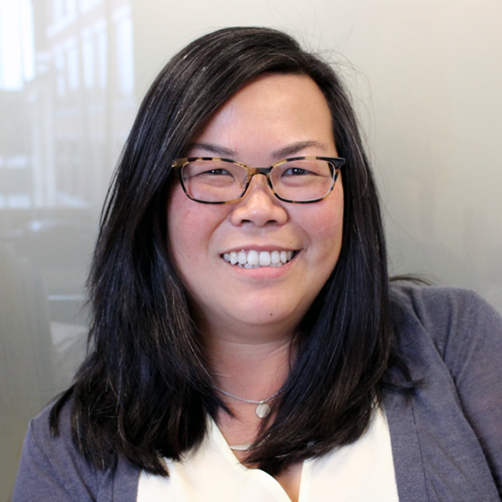 Elaine Ng, a 25-year veteran of the nonprofit and education sectors, was appointed CEO of TSNE in May 2018. Elaine’s passion and commitment are for organizations that shift the paradigm of equity and access.
Elaine Ng, a 25-year veteran of the nonprofit and education sectors, was appointed CEO of TSNE in May 2018. Elaine’s passion and commitment are for organizations that shift the paradigm of equity and access.
In the past few years, several landmark studies have shined a spotlight on disconnects in the nonprofit sector’s efforts to recruit people of color into leadership positions and include them in decision-making on policies and institutional practices that impact people and communities of color.
Elaine recently shared her thoughts on how TSNE will address these issues in the nonprofit sector through developing partnerships that move forward a collaborative agenda focused on advancing equity and inclusion.
Q: As the new CEO, what excites you about the future of TSNE?
A: For many years, I experienced TSNE as a client and as a member of the nonprofit community in Boston; it was a place I came to for expertise, training and organizational support. Until I came on as the Interim Director of Operations, however, I never realized the immense depth of this organization. It has the opportunity to really shift into a capacity-builder that can help change the game for organizations doing work on the ground in our communities. This means that TSNE must become more of a voice, a leader and a connector so we can play a bigger role in advocating for those we work with and the people they serve. We can also leverage opportunities to work with other capacity builders and funders to further the interests of the clients we all work with and build equity and access strategies in our nonprofits, our city, the region and on a national scale.
Q: Why is this type of advocacy agenda important for nonprofits?
A: At this moment in our socio-political history, nonprofits are needed more than ever. But we cannot stand alone; there is also an opportunity for us to build a coalition of nonprofits with a collaborative agenda that supports broader social progress. As a sector representing millions of people, we can be more aligned and intentional about framing our issues and developing a common narrative of the sector’s importance and impact on the lives of those who rely on us.
Every nonprofit is always running up against its individual capacity to do more for the people they serve. Our agenda should include delivering resources to create effective partnerships and advocating together for funding that makes organizations more resilient and builds toward equity, so we can not only sustain what we do, but continue to advance the work we all engage in.
Q: Why are you so passionate about this work?
A: I have spent my career working to advance equity and build capacity for people to create their own opportunities for a better life.
As a child of immigrants living in Boston’s Chinatown neighborhood, I know what it’s like to navigate and straddle two very different cultures; I know what it’s like to grow up in a family where every penny counts; and I know what it’s like to learn English in school. I also grew up in Boston during busing, experiencing racism from peers and teachers when I couldn’t even put a name to it. In college, I was exposed to ethnic studies and learned a whole ‘alternative version’ of the history I learned in public school. It documented and gave voice to folks whose lives and struggles I identified with – and which are as relevant today as they were in the past.
I believe in the power of people coming together, learning from each other about our individual lived experiences and being a voice for advocating for better futures that include everyone.
Q: How will TSNE be different for your clients and respond to shifts happening in the nonprofit sector?
A: Organizations no longer have the luxury to plan and then execute; often, they are in the position of responding to what seems like an endless string of crises — whether from a public policy perspective or a crisis of funding and survival. We are working under different circumstances now — moving from a traditional nonprofit organizing to support a community need to a surge of networks and people mobilizing to respond to policy shifts.
TSNE is adapting our services and learning how to adjust our tools and frameworks and streamline our systems and processes to support networks more effectively. We are also intentionally hiring staff with a range of skills and experience working with all types of organizational structures to enhance our capacity to be responsive to the evolving needs of our clients and partners.
I’m excited by the immense opportunity and potential of TSNE to become a highly effective capacity-builder and a leading voice for nonprofits regionally and nationally. It’s exciting to think about the potential impact that TSNE can have and to be a part of this critical work.